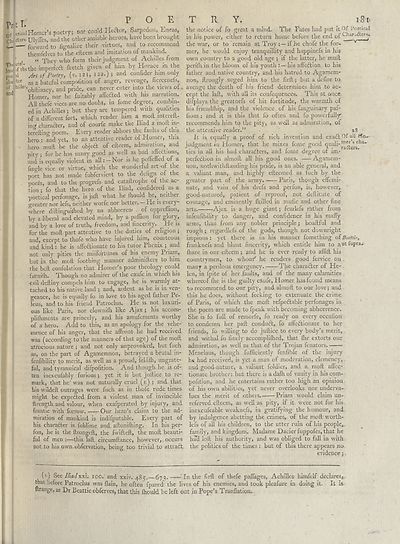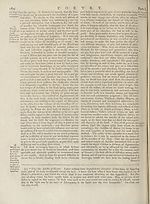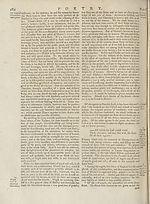Encyclopaedia Britannica > Volume 15, PLA-RAM
(219) Page 181
Download files
Complete book:
Individual page:
Thumbnail gallery: Grid view | List view

P,nl. ' POE
J CticalHomer’s poetry; nor coaM HeSor, Sarpedon, Eneas,
Ch; ‘ft61-1” Ulyffes, and the other amiable heroes, have been bi ought
u- forward to fignalize their virtues, and to recommend
themfelves to the elleem and imitation of mankind.
I J' u They who form their judgment of Achilles from
alnhcthe imperfect (Iretch given of him by Horace in the
E,.1,i Ar; of Poetry, (v. 121, 122.) ; and confide.- him only
cba[itfcr as a hateful compofition of anger, revenge, fieiceneis,
,,f, hilleC’obftinacy, and pride, can never enter into the views of.
^ Homer, nor be fuitably affeded with his narration.
AH thefe vices are no doubt, in fome degree, combin¬
ed in Achilles; but they are tempered with qualities
of a different fort, which render him a moil mterell-
ing character, and of courfe make the Iliad a moil in-
tereiling poem. Every reader abhors the faults of this
hero : and yet,, to an attentive reader of Homer, this
hero muff be the objed of efteem, admiration, and
pity ; for he has many good as well as bad affections,
and is equally violent in all: —Nor is he poffeffed of a
fmgle vice or virtue, which the wonderful art-of the
poet has not made fubfervient to the deiign of the
poem, and to the progrefs and cataffrophe of the ac¬
tion; fo that the hero.of the Iliad, coniidered as a
poetical perfonage, is juft what he ihould be, neither
greater nor lefs, neither worfe nor better. He is every
where diftinguiihed by an abhorrem . of oppieffion,
by a liberal and elevated mind, by a paffion for glory,
and by a love of truth, freedom, and iincerity. He is
for the moil part attentive to the duties of religion ;
and, except to thofe who have injured him, couiteous
and kind : he is affedionate to his tutor Phenix ; and
not only pities the misfortunes of his enemy Priam,
but in the moft foothing manner adminifters to him
the bell confolation that Homer’s poor theology could
furnifh. Though no admirer of the caufe in which his
evil deftiny compels him to engage, he is warmly at¬
tached to his native land ; and, ardent as he is in ven¬
geance, he is equally fo in love to his aged father Pe-
leus, and to his friend Patroclus. He is not luxuri¬
ous like Paris, nor clownifh like Ajax ; his accom-
plilhments are princely, and his amufements worthy
of a hero. Add to tliis, as an apology for the vehe¬
mence of his anger, that the affront- he had received
was (according to the manners of that age) of the moft
atrocious nature ; and not only unprovoked, but fuch
as, on the part of Agamemnon, betrayed a brutal m-
fenfibility to merit, as well as a proud, felaih, ungrate¬
ful, and tyrannical difpofttion. And though he is of¬
ten inexcufably furious; yet it is but juftice to re¬
mark, that he was not naturaUy cruel (e) ; and. that
his wildeft outrages were fuch as in thole rude times
might be expected from a violent man of invincible
ftrength and valour, when exafperated by injury, and
frantic with forrow. Our hero’s claim to the ad¬
miration of mankind is indifputable. Every part of
his charadter is fublime and aftonilhing. In his per-
fon, he is the ftrongeft, the fwifteft, the moft beauti¬
ful of men :—this laft circumftance, however,. occurs
not to his own obfervation, being too trivial to attract
U Y.
18 r
the notice of fo great a mind. The Fates had put it Of Poetical
in his power, either to return home before the end of khar^&ers.
the war, or to remain at Troy : —if he chofe the for¬
mer, he would enjoy tranquillity and happinefs in his
own country to a good old age ; if the latter, he mail
perilh in the bloom of his youth :—his affedlion to his
father and native country, and his hatred to Agamem¬
non, ftrongly urged him to the firft; but a defire to
avenge the death of his friend determines him to ac¬
cept the laft, with all its confequences. This at once
difplays the greatnefs of his fortitude, the warmth of
his friendlhip, and the violence of his fanguinary paf-
lions: and it is this that fo often and fo powerfully'
recommends him to the pity, as well as admiration, of
the attentive reader.” aS
It is equally a proof of rich invention and exadl Of iiH ffo-
judgment in Homer, that he mixes fome good ftua^"^A{(.3rbcha'*
ties in all his bad characters, and fome degree of im-
perfection in almoft all his good ones. Agamem¬
non, nothwithftanding his pride, is an able general, and
a valiant man, and highly eftecmed as Inch by the
greater part of the army. Paris, though effemi¬
nate, and vain of his drefs and per fan, is, however,
good-natured, patient of reproof, not deftitute of
coinage, and eminently {killed in muftc and other fine
arts. Ajax is a huge giant; fearlefs rather from
infallibility to danger, and confidence in his maffy
arms, than from any nobler principle; boaftful and
rough ; regardlefs of the gods, though not downright
impious : yet there is in his manner fomething of Beattir,
fraiiknefs and blunt fmcerity, which entitle him to autfupra-
{hare in our efteem; and he is ever ready to afftil his
countrymen, to whom/ he renders good fervice on
many a perilous emergency. The characler of He¬
len, in fpite of her faults, and of the many calamities
whereof {he is the guilty caufe, Homer has found means
to recommend to our pity, and almoft to our love; and
this he does, without feeking to extenuate the crime
of Paris, of which the moft refpeftable perfonages in
the poem are made to fpeak with becoming abhorrence.
She is fo full of remorfe, fo ready on every occafioti
to condemn her paft conduft, fo affeftionate to her
friends, fo willing to do juftice to every body’s merit,
and withal fo finely accompliihed, that {he extorts our
admiration, as well as that of the Trojan fenators.
Menelaus, though fufficiently fenfible of the injury
he had received, is yet a man of moderation, clemency,
and good- nature, a valiant foldier, and a moft affec¬
tionate brother: but there isadafiiof vanity in his com¬
pofition, and he entertains rather too high an opinion
of his own abilities, yet never overlooks nor underva¬
lues the merit of others. Priam would claim un-
referved efteem, as well as pity, if it were not for his
inexcufeable weaknefs, in gratifying the humour, and
by indulgence abetting the crimes, of the moft worth-
lefs of all his children, to the utter ruin of his people, .
family, and kingdom. Madame Dacier fuppofes, that he
had loft his authority, and was obliged to fall in with.
the politics of the times : but of this there appears no
evidence j.
(E) See Iliadxxi. too. and xxiv. 485.—673. In the firft of thefe paffages, Achilles himftlf declares*-
that before Patroclus was {lain, he often fpared the lives of his enemies, and took pleafure in doing it. It is
ftrange, as p)r Beattie obferves, that this Ihould. be left out in Pope’s Tranflation.
J CticalHomer’s poetry; nor coaM HeSor, Sarpedon, Eneas,
Ch; ‘ft61-1” Ulyffes, and the other amiable heroes, have been bi ought
u- forward to fignalize their virtues, and to recommend
themfelves to the elleem and imitation of mankind.
I J' u They who form their judgment of Achilles from
alnhcthe imperfect (Iretch given of him by Horace in the
E,.1,i Ar; of Poetry, (v. 121, 122.) ; and confide.- him only
cba[itfcr as a hateful compofition of anger, revenge, fieiceneis,
,,f, hilleC’obftinacy, and pride, can never enter into the views of.
^ Homer, nor be fuitably affeded with his narration.
AH thefe vices are no doubt, in fome degree, combin¬
ed in Achilles; but they are tempered with qualities
of a different fort, which render him a moil mterell-
ing character, and of courfe make the Iliad a moil in-
tereiling poem. Every reader abhors the faults of this
hero : and yet,, to an attentive reader of Homer, this
hero muff be the objed of efteem, admiration, and
pity ; for he has many good as well as bad affections,
and is equally violent in all: —Nor is he poffeffed of a
fmgle vice or virtue, which the wonderful art-of the
poet has not made fubfervient to the deiign of the
poem, and to the progrefs and cataffrophe of the ac¬
tion; fo that the hero.of the Iliad, coniidered as a
poetical perfonage, is juft what he ihould be, neither
greater nor lefs, neither worfe nor better. He is every
where diftinguiihed by an abhorrem . of oppieffion,
by a liberal and elevated mind, by a paffion for glory,
and by a love of truth, freedom, and iincerity. He is
for the moil part attentive to the duties of religion ;
and, except to thofe who have injured him, couiteous
and kind : he is affedionate to his tutor Phenix ; and
not only pities the misfortunes of his enemy Priam,
but in the moft foothing manner adminifters to him
the bell confolation that Homer’s poor theology could
furnifh. Though no admirer of the caufe in which his
evil deftiny compels him to engage, he is warmly at¬
tached to his native land ; and, ardent as he is in ven¬
geance, he is equally fo in love to his aged father Pe-
leus, and to his friend Patroclus. He is not luxuri¬
ous like Paris, nor clownifh like Ajax ; his accom-
plilhments are princely, and his amufements worthy
of a hero. Add to tliis, as an apology for the vehe¬
mence of his anger, that the affront- he had received
was (according to the manners of that age) of the moft
atrocious nature ; and not only unprovoked, but fuch
as, on the part of Agamemnon, betrayed a brutal m-
fenfibility to merit, as well as a proud, felaih, ungrate¬
ful, and tyrannical difpofttion. And though he is of¬
ten inexcufably furious; yet it is but juftice to re¬
mark, that he was not naturaUy cruel (e) ; and. that
his wildeft outrages were fuch as in thole rude times
might be expected from a violent man of invincible
ftrength and valour, when exafperated by injury, and
frantic with forrow. Our hero’s claim to the ad¬
miration of mankind is indifputable. Every part of
his charadter is fublime and aftonilhing. In his per-
fon, he is the ftrongeft, the fwifteft, the moft beauti¬
ful of men :—this laft circumftance, however,. occurs
not to his own obfervation, being too trivial to attract
U Y.
18 r
the notice of fo great a mind. The Fates had put it Of Poetical
in his power, either to return home before the end of khar^&ers.
the war, or to remain at Troy : —if he chofe the for¬
mer, he would enjoy tranquillity and happinefs in his
own country to a good old age ; if the latter, he mail
perilh in the bloom of his youth :—his affedlion to his
father and native country, and his hatred to Agamem¬
non, ftrongly urged him to the firft; but a defire to
avenge the death of his friend determines him to ac¬
cept the laft, with all its confequences. This at once
difplays the greatnefs of his fortitude, the warmth of
his friendlhip, and the violence of his fanguinary paf-
lions: and it is this that fo often and fo powerfully'
recommends him to the pity, as well as admiration, of
the attentive reader.” aS
It is equally a proof of rich invention and exadl Of iiH ffo-
judgment in Homer, that he mixes fome good ftua^"^A{(.3rbcha'*
ties in all his bad characters, and fome degree of im-
perfection in almoft all his good ones. Agamem¬
non, nothwithftanding his pride, is an able general, and
a valiant man, and highly eftecmed as Inch by the
greater part of the army. Paris, though effemi¬
nate, and vain of his drefs and per fan, is, however,
good-natured, patient of reproof, not deftitute of
coinage, and eminently {killed in muftc and other fine
arts. Ajax is a huge giant; fearlefs rather from
infallibility to danger, and confidence in his maffy
arms, than from any nobler principle; boaftful and
rough ; regardlefs of the gods, though not downright
impious : yet there is in his manner fomething of Beattir,
fraiiknefs and blunt fmcerity, which entitle him to autfupra-
{hare in our efteem; and he is ever ready to afftil his
countrymen, to whom/ he renders good fervice on
many a perilous emergency. The characler of He¬
len, in fpite of her faults, and of the many calamities
whereof {he is the guilty caufe, Homer has found means
to recommend to our pity, and almoft to our love; and
this he does, without feeking to extenuate the crime
of Paris, of which the moft refpeftable perfonages in
the poem are made to fpeak with becoming abhorrence.
She is fo full of remorfe, fo ready on every occafioti
to condemn her paft conduft, fo affeftionate to her
friends, fo willing to do juftice to every body’s merit,
and withal fo finely accompliihed, that {he extorts our
admiration, as well as that of the Trojan fenators.
Menelaus, though fufficiently fenfible of the injury
he had received, is yet a man of moderation, clemency,
and good- nature, a valiant foldier, and a moft affec¬
tionate brother: but there isadafiiof vanity in his com¬
pofition, and he entertains rather too high an opinion
of his own abilities, yet never overlooks nor underva¬
lues the merit of others. Priam would claim un-
referved efteem, as well as pity, if it were not for his
inexcufeable weaknefs, in gratifying the humour, and
by indulgence abetting the crimes, of the moft worth-
lefs of all his children, to the utter ruin of his people, .
family, and kingdom. Madame Dacier fuppofes, that he
had loft his authority, and was obliged to fall in with.
the politics of the times : but of this there appears no
evidence j.
(E) See Iliadxxi. too. and xxiv. 485.—673. In the firft of thefe paffages, Achilles himftlf declares*-
that before Patroclus was {lain, he often fpared the lives of his enemies, and took pleafure in doing it. It is
ftrange, as p)r Beattie obferves, that this Ihould. be left out in Pope’s Tranflation.
Set display mode to:
![]() Universal Viewer |
Universal Viewer | ![]() Mirador |
Large image | Transcription
Mirador |
Large image | Transcription
Images and transcriptions on this page, including medium image downloads, may be used under the Creative Commons Attribution 4.0 International Licence unless otherwise stated. ![]()
| Encyclopaedia Britannica > Encyclopaedia Britannica > Volume 15, PLA-RAM > (219) Page 181 |
|---|
| Permanent URL | https://digital.nls.uk/191903623 |
|---|
| Attribution and copyright: |
|
|---|
| Description | Ten editions of 'Encyclopaedia Britannica', issued from 1768-1903, in 231 volumes. Originally issued in 100 weekly parts (3 volumes) between 1768 and 1771 by publishers: Colin Macfarquhar and Andrew Bell (Edinburgh); editor: William Smellie: engraver: Andrew Bell. Expanded editions in the 19th century featured more volumes and contributions from leading experts in their fields. Managed and published in Edinburgh up to the 9th edition (25 volumes, from 1875-1889); the 10th edition (1902-1903) re-issued the 9th edition, with 11 supplementary volumes. |
|---|---|
| Additional NLS resources: |
|

